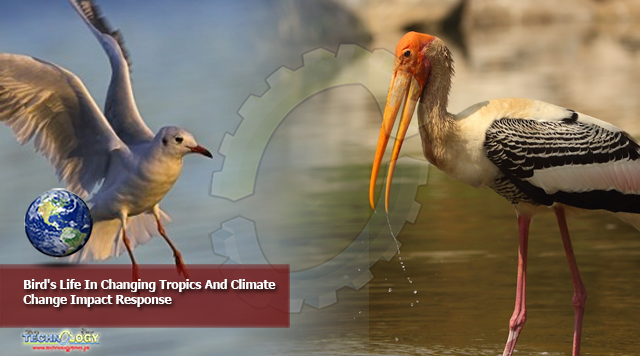Bird Life In Changing Tropics And Climate Change Impact Response: Two new studies in the journal Nature Climate Change highlight the delicate balance birds face in trying to survive global warming in the tropics.

Bird’s Life In Changing Tropics And Climate Change Impact Response : In the first, an international team led by Australia’s University of Queensland reveals the high number of waterbird species being pushed out of tropical areas because of rising temperatures.
In the second, researchers from the University of Montana, US, suggest that tropical songbird species with longer lifespans may be able to mitigate the impacts of stressful climate events by reducing reproduction in those years.
In their work, UQ’s Tatsuya Amano and colleagues reviewed more than 1.3 million records of 390 species collected from 6800 sites in more than 100 countries since 1990 by volunteers from the International Waterbird Census and Christmas Bird Count. All sites are between 55 degrees south and 64 degrees north.
They found that 69% of the tropical species show, on average, negative responses to temperature increases.
“[W]e show that with temperature increase, the abundance of species and populations decreased at lower latitudes, particularly in the tropics, but increased at higher latitudes.
“These contrasting latitudinal responses indicate potential global-scale poleward shifts of species abundance under climate change. The negative responses to temperature increase in tropical species are of conservation concern.”
Waterbirds can be observed relatively easily, the researchers say, offering an early proxy for climate change impacts on other species.
“Earlier global reviews have rarely included species and studies in the tropics, being largely conducted in Europe, North America, Australia and the Arctic,” Amano says.
“As a result, although tropical species have long been predicted to be more vulnerable to increasing temperature, there was little empirical evidence…”
The researchers note that climate change is not the only threat to waterbirds; impacts of other major threats, such as loss and degradation of wetlands and excessive hunting pressure, “seem to be more severe in the tropics, too”.
In the second study, Thomas Martin and James Mouton describe field demographic studies of tropical songbirds over multiple years in Venezuela and Malaysia – including one drought year for each site – and their modelling of future population dynamics under three climate change scenarios.
They found that reproduction was reduced during drought by an average of 36% in the 20 Malaysian species and 52% in the 18 Venezuelan species.
For most long-lived species that reduced reproduction, survival increased relative to years without droughts, whereas survival rates decreased for species that did not reduce reproduction, or did not substantially reduce reproduction, as well as for those heavily reliant on wet habitats.
The negative effects of drought on modelled population growth were lower for longer-lived rather than shorter-lived species under climate change.
“The results here suggest that longer-lived tropical species may be more resilient to at least some forms of climate change than currently thought, although with an important caveat for wet-microhabitat specialists,” the authors write.
Originally published at Cosmos magazine